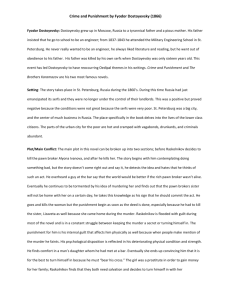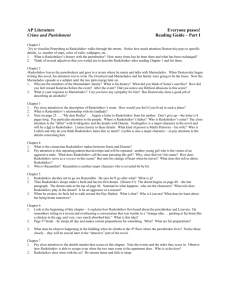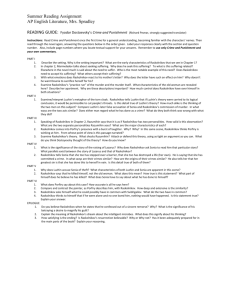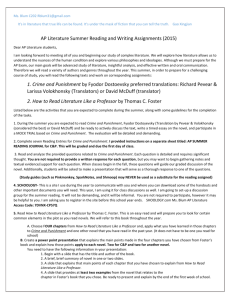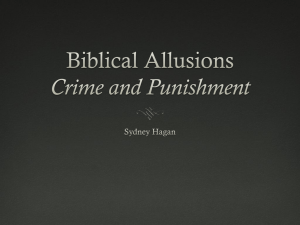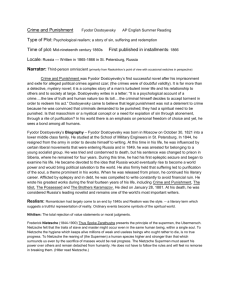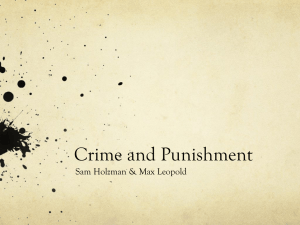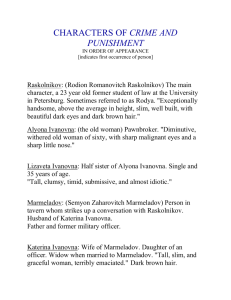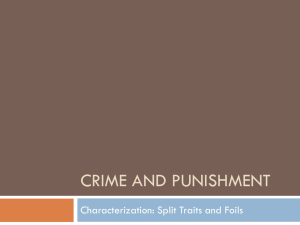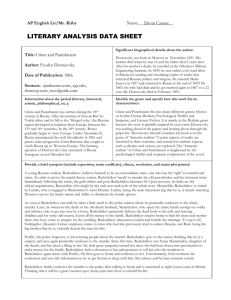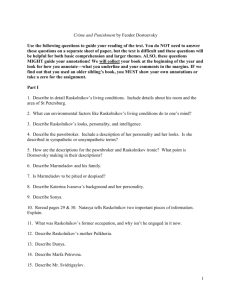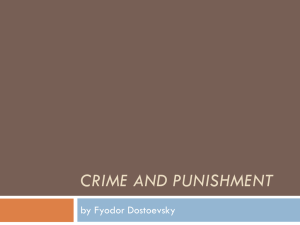Crime and Punishment essay final
advertisement
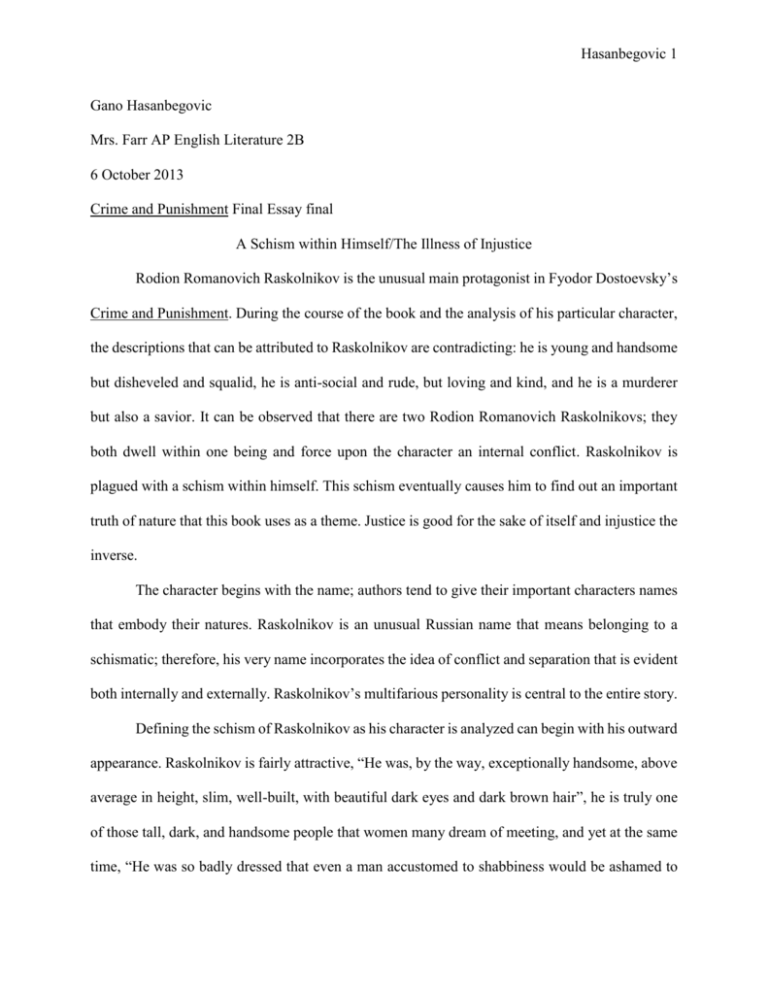
Hasanbegovic 1 Gano Hasanbegovic Mrs. Farr AP English Literature 2B 6 October 2013 Crime and Punishment Final Essay final A Schism within Himself/The Illness of Injustice Rodion Romanovich Raskolnikov is the unusual main protagonist in Fyodor Dostoevsky’s Crime and Punishment. During the course of the book and the analysis of his particular character, the descriptions that can be attributed to Raskolnikov are contradicting: he is young and handsome but disheveled and squalid, he is anti-social and rude, but loving and kind, and he is a murderer but also a savior. It can be observed that there are two Rodion Romanovich Raskolnikovs; they both dwell within one being and force upon the character an internal conflict. Raskolnikov is plagued with a schism within himself. This schism eventually causes him to find out an important truth of nature that this book uses as a theme. Justice is good for the sake of itself and injustice the inverse. The character begins with the name; authors tend to give their important characters names that embody their natures. Raskolnikov is an unusual Russian name that means belonging to a schismatic; therefore, his very name incorporates the idea of conflict and separation that is evident both internally and externally. Raskolnikov’s multifarious personality is central to the entire story. Defining the schism of Raskolnikov as his character is analyzed can begin with his outward appearance. Raskolnikov is fairly attractive, “He was, by the way, exceptionally handsome, above average in height, slim, well-built, with beautiful dark eyes and dark brown hair”, he is truly one of those tall, dark, and handsome people that women many dream of meeting, and yet at the same time, “He was so badly dressed that even a man accustomed to shabbiness would be ashamed to Hasanbegovic 2 be seen in the street in such rags” (Dostoevsky 6). His handsome appearance is hidden by dirty shabbiness. This parallels to his personality. Within him he has quite a kind handsome personality but that fact is tarnished by his dirty actions of first degree murder and angry outbursts. His crime is the worn impoverished clothing that brings attention away from his handsome attributes. Another external condition that parallels the two parts of Raskolnikov are the people he interacts with: Dmitri Prokofich Razumikhin parallels with Raskolnikov’s rationality while Arkady Ivanovich Svidrigailov parallels with his delirium, Sofia Semionovna Marmeladov parallels with his good selflessness while Peter Petrovich Luzhin parallels with his pride, and Advotia Romanovna Raskolnikov (Dunia) parallels with his beauty while Semion Zaharovich Marmeladov parallels with his poverty and shabbiness. Sofia and Dunia are interchangeable as they both are selfless, good, and beautiful. There are others that parallel as well such as his mother who is another parallel to his kindness, and the old lady who parallels his rudeness. Because they are such opposites, the two parts of Raskolnikov hate each other, so each part hates the people that represent its opposite. The good part of Raskolnikov is disgusted at Luzhin, Svidrigailov, the old lady, and Marmeladov, for being dirty and perverse, while his evil part is annoyed with his sister, mother, and Razumikhin for their beauty and goodness. This conflict contributes to his isolation, and his confusing irritation with the people he loves, “Zossimov…noticed no joy in him at the arrival of his mother and sister…he saw later that almost every word…seemed to touch on some sore place and irritate it” (213). His annoyance of his family confuses Raskolnikov. The good part of him loves them, he knows he loves them, “‘Yet when they were gone I seemed to love them so much,’ flashed through his mind” (218); the recently growing bad part makes him feel so annoyed by them when they are around, “…if you love me…give me up, or else I shall begin to hate you, I feel it. Goodbye” (299). Hasanbegovic 3 Raskolnikov, from the very beginning of the story, has been described as not very social, “he has become so completely…isolated from everyone else that he dreaded meeting…anyone at all” (5). He hates average people, is annoyed by useless gossip and palaver, and is disgusted by the squalid nature of the city itself and its inhabitants, “The unbearable stench from the taverns… and the drunken men whom he met continually… completed the revolting misery of the picture. An expression of the deepest disgust gleamed… in the young man’s refined face” (6). This selfimposed isolation is because of his pride and disgust. He is handsome and walks with an air of respectability and has the means to crawl out of poverty, he just does not want to, so to him he is not like the rest of the poor who are stuck where they are. His pride caused him to not have many friends at the university because he did not socialize with anyone, acted haughty and felt they were all beneath him (52). He decides to isolate himself from these people who are below him. Isolation, however, turned out to be worse than the city. While in isolation Raskolnikov was shut up in his own filth, poverty, pride, and ego. This environment fostered his absurd thoughts that he may be a person who can overstep boundaries. The good part of him could not take it anymore, and he had to get out “…he felt a desire to be with other people… He was so weary after a whole month of concentrated wretchedness and gloomy excitement that he longed to rest” (13). After he commits the murder Raskolnikov feels isolated in a different way, “…now he would never be able to talk freely about everything, that never again would he be able to talk freely about anything to anyone” (219). He is stuck with the burden of hiding his crime. The good part of Raskolnikov hates this. He does not want to be isolated in this way. He needs to let it out. That is why he turns to the loving Sonia, “No-one of them will understand, if you tell them, but I have understood. I need you, that is why I have come to you” (315). He has been alone for so long that it has strengthened the bad part of Raskolnikov. His good part craves the company of Sonia for Hasanbegovic 4 she can release his good qualities and help him overcome his evil and rehabilitate himself, “But that is the beginning of a new story—the story of the gradual renewal of a man, the story of his gradual regeneration, of his transition from one world into another, of hid initiation into a new, unknown life...” (521). Yes Raskolnikov is rude, proud, egotistic, delusional, and, last but not least, a killer; however, at the same time he has and shows redeeming traits and actions in rare moments of truth such as when he is worried about the young drunk girl on the street who is being pursued by a shady man, and tries to fight the man, and gives 20 kopecks so that a police officer will help the girl (47-51), or his kindness at the time of Marmeladov’s death, or when “he had helped a poor… fellow student and had spent his last penny on supporting him for six months, and when this student died, leaving a decrepit old father… Raskolnikov had got the old man into a hospital and paid for his funeral when he died” (509). He also can show gentle kindness with his family. He resolves his conflict with his sister with a light grasping of hands and a warm smile, “…The mother was thinking to herself. ‘What general impulses he has, and how simply, how delicately he put an end to all the misunderstanding with his sister—just by holding out his hand…and looking at her like that…” (215). Along with the negative traits above, it seems that Raskolnikov is incapable of love, “…‘ He loves no-one and perhaps never will,’ Razumikhin declared decisively” (207). This is actually a misunderstanding; he shuns away from the people that love him not because he does not feel the same, but because he loves them too much. He knows that he is bad and does not want his evilness to be a burden or cause harm to the ones he loves “You…will only suffer misery… on my account” (393). He does not want Dunia marrying Luzhin because he is too proud and lazy to support himself (222), and he does not want Sonia to move to Siberia when he is going to be imprisoned Hasanbegovic 5 (400). His love of others and hate of himself is the cause of him trying to cut his ties with his family, “…‘ He is insane but not heartless. He is mad! Don’t you see? It’s heartless of you to say it!’ Razumikhin whispered in her ear…” (299). “You, Rodion Romanovich! You are the murderer,” (433). Yes, it is true, Raskolnikov is a murderer. The reader of this analysis at this point may be thinking, “It cannot be the case that a first degree murderer can be a good person. That is an oxymoron, a contradiction, an impossibility!” It may seem so; however, Raskolnikov himself is a contradiction. He is a murderer, but he is also a savior, “Raskolnikov had rescued two little children from a house on fire and was burnt in doing so” (509). He saves a girl on the street from possibly being raped and/or killed, he saves Dunia from selling herself to Luzhin, and he makes attempts to save the Marmeladovs; in his delusional dreams he worried about the landlady being beat to death and about a poor mare being abused. When looking at Raskolnikov’s life as a whole, it can be determined that he is not a natural murderer. That action seemed to be an abnormality. The change was caused by perverse and squalid recent circumstances of poverty and isolation. The true, original, and natural Raskolnikov is good. As mentioned earlier in this analysis, Raskolnikov’s handsome nature is suffocated with the shabby clothing of evil, pride, and isolation. These things became a second Raskolnikov; they became a Raskolnikov that, due to all his pride, ego, and sickness, falsely believed that he was special enough that he could overstep boundaries and kill (396). These thoughts were born from pride and raised in isolation; however, his true good nature did fight the thoughts. The now two Raskolnikovs were at war. His true self denied that he was going to kill the woman, called it hideous, but his conscience was losing the battle and Raskolnikov became more and more convinced that he was actually going to attempt it (7-60). Even when he accepted that he was going Hasanbegovic 6 to kill the woman, he was disgusted and afraid of the act, “I knew I could bring myself to it… I could never bear to do it…the very thought of it made me feel sick…and filled me with horror…I couldn’t stand it” (60). He even tried to completely give up on the idea, “ ‘…I renounce that accursed… dream of mine.’…he was free now from that spell…that obsession” (60-61). The good resisted; however, the sickness and isolation had poisoned him too much. He ended up committing an evil and unjust act (for the two are the same thing) and was punished for it severely. That brings this essay to its next purpose. There may be many themes found in Crime and Punishment; one of these themes is the very core of this story. The book is named in reference to this theme. It is a two part theme, with the focus heavily being on the second part. The first is that Justice is good for a person in-of-itself and the second part is the inverse, that Injustice is bad for a person in-and-of-itself. This is where the title comes in. The injustice is the Crime, and the resulting consequences, feelings, and events are the Punishment. Now, reader, do not be mistaken, the punishment is not just Raskolnikov’s sentence at the end of the book. The punishment is everything Raskolnikov felt after murder. He almost immediately became sick. “The conviction that all his faculties were failing him, even his memory and his most basic powers of reflection, became to be an insufferable torture. ‘ Surely it isn’t beginning already? Surely it isn’t my punishment coming upon me? It is!’…” (90). His punishment continued to grow in severity. He was sick and dizzy, he went delusional and hallucinated, he became easily irritated and his mind was clouded. He was being tortured from the inside by nature. He realized that he isolated himself from everyone and his secret became a giant burden on his shoulders that he could not share for fear of being punished by the law and judged by the public. He could no longer talk freely to anyone, not even his family, “He was suddenly overwhelmed with confusion and turned pale, Again that awful sensation he had known of late passed with deadly chill over his soul…The Hasanbegovic 7 anguish of this thought was such that for a moment he almost forgot himself” (219). He was in a state of constant suffering. That was his punishment. Sonia understood this right away when she found out what he had done, “…What have you done to yourself…there is no-one…in the whole world now who is as unhappy as you” (391). (On a side note that goes back to the previous topic of Raskolnikov’s goodness. The fact that he was able to feel this suffering is proof that he is good in his nature. A good man suffers for injustice, while only sociopaths (psychopaths, people with anti-social disorders, etc.) feel nothing from evil acts.) The epilogue, with his imprisonment, was actually not punishment, but a good outcome caused by justice. Raskolnikov’s acts of justice all naturally led to things that would heal his suffering soul. He was generous to the Marmeladovs, and was given Sonia, he helped his fellow student and saved two children from a fire, and his sentence was lessened, he admitted his guilt, and was given the means to recover. If not for Siberia and Sonia, Raskolnikov might have suffered forever. Raskolnikov. His very nature is a schism. He is good and bad, and he is just and unjust. A twisted part of him was created from pride and isolation that fought with his original kind self. This perverse Raskolnikov caused him to commit an act of injustice and suffered a novel of punishment for it; however, his good soul helped him do what is just and his process of healing began. It is a shame that, “the subject of a new story” (521), what may have been a beautiful story, of Raskolnikov was never written. We fully met the poor Raskolnikov who had the schism within him, and we were shown the illness of injustice to a great extent, but we only got a hint of the great Raskolnikov who is whole, and of the panacea of justice. Hasanbegovic 8 Work Cited Dostoevsky, Fyodor. Crime and Punishment. New York: Barns & Noble Books, 2007
